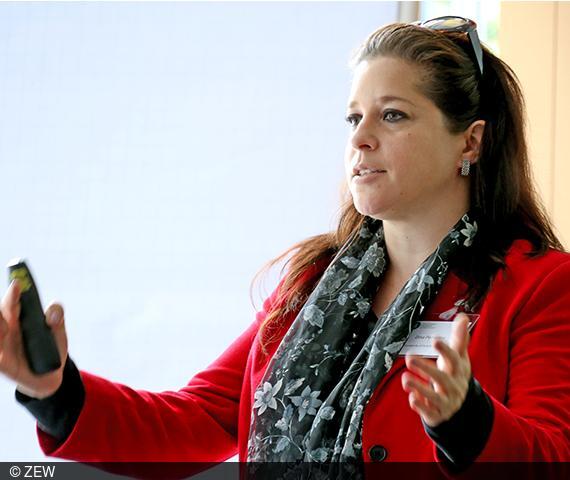International Conference on Public Finance at ZEW
ConferencesOn 8 and 9 June 2017, the CEPR Public Economics Annual Symposium was held at ZEW in Mannheim. The symposium is one of the most important European conferences in the field of public finance. The event was attended by around 30 international researchers who came to discuss their latest research findings on topics such as public procurement, taxation and wealth distribution.
The annual conference is organised by the Centre for Economic Policy Research in collaboration with renowned research institutions across Europe. This year the research network collaborated with ZEW and the University of Mannheim for the event. Thanks to this cooperation, the academic organiser of the event, Professor Henrik Kleven from the London School of Economics (LSE), together with Mannheim-based economists, were able to attract the same pedigree of widely respected researchers as in previous years with the broad spectrum of research topics up for discussion at the symposium.
Internationally renowned economists discuss a broad range of issues
The programme consisted of seven sessions, with each session dealing with a different aspect of taxation, finance and distribution. The specific focus of the individual sessions were as follows: developing countries, empirical tax studies, wealth inequality, social insurance, optimal tax theory, information asymmetry, and labour markets. Among those presenting their research was Dina Pomeranz, a professor at the University of Zurich, who had been investigating public procurement in Chile. She revealed that audits conducted by public authorities, contrary to their initial intentions, actually lead to less transparent and less efficient procurement mechanisms. Professor Stefanie Stantcheva from Harvard University had been looking at the French tax system to investigate how self-employed people adapt their working behaviour in response to changes to individual parameters in the tax framework. Her findings showed that self-employed people work less when their income is subject to higher taxation. Professor Claus Kreiner at the University of Copenhagen had been trying to determine whether a lower minimum wage for younger workers up to a certain age leads to higher rates of employment. His results showed that unemployment rates among those who had previously received the lower minimum wage increased greatly as soon as these workers were old enough to fall into the higher standard minimum wage bracket. A lower minimum wage thus appears to significantly reduce youth unemployment for workers under the age of 18. ZEW research associate Professor Andreas Peichl from the ifo Institute in Munich, presented a study produced in cooperation with ZEW on how pension information letters affect people’s savings behaviour for retirement. The results of the study clearly showed that these pension statements provide people with considerable motivation to invest more money in private pension funds. These empirical studies were complemented by more theoretical papers, such as Professor Florian Scheuer from the University of Zurich's research on optimal tax theory. The paper merges two basic and very well-known models – the Mirrlees and Diamond Mirrlees models – and has caused quite a stir in the world of economics.
First-class cooperation between ZEW and CEPR
The Centre for Economic Policy Research (CEPR) was founded in London in 1983 and boasts a vast international network of leading economists. The research network holds the CEPR Public Economics Annual Symposium every year to provide a forum for high-quality academic research in the field of public finance whilst also bringing together researchers in the field from all over the world. The event is regularly attended by internationally renowned experts in the area of public finance. In past years, for instance, economists such as Sir Tony Atkinson from the University of Oxford, Alan Auerbach from the University of California in Berkeley, Sir Richard Blundell from University College London, Raj Chetty from Stanford University and Thomas Piketty from the Paris School of Economics have used the symposium as a platform to discuss their research.
